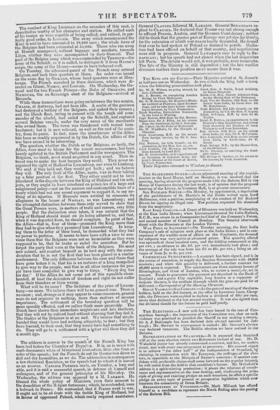The address in answer to the speech o fthe French King
has been laid before the Chamber of Deputies. It is, as is usual with such documents when of Ministerial fabrication, little else than an echo of the speech ; but the French do not tie themselves down to dull and dry formalities, as we do. The address has in consequence a few rhetorical flourishes, as the speech had to which it is moved as an answer. CASIMIR PERRIER made, on Tuesday, a long and able, and it is said a successful speech, in defence of Himself and colleagues, and of the general principles of his Ministry. On Wednesday, the address was opposed by a M. LARABIT. He blamed the whole policy of Ministers, even their consent to the demolition of the Belgian fortresses; which, he contended, were a bulwark to France. He contended, that if France went to war, it ought not to be ab irato with the feeble King of Holland, but in favour of oppressed Poland, which really required assistance. General CLAUSEL followed M. LARABIT. General SEBASTIANI re- plied to CLAUSEL. He declared that France was not strong enough to affront Prussia, Austria, and the German Confederacy; neither did he think that the greater part of Europe was yet ripe for liberty, for the extension of which war was so loudly demanded. He denied that ever he had spoken of Poland as doomed to perish. Media- tion had been offered on behalf of that country, and negotiations were still in progress. General LAMARQUE rose to reply to SE- BASTIANI; but his speedh had not closed when the last despatches left Paris. The debate would not, it was probable, soon terminate. The fate of the Ministry is still dependent ; but the late warlike diversion renders their position more secure than it was.


























 Previous page
Previous page